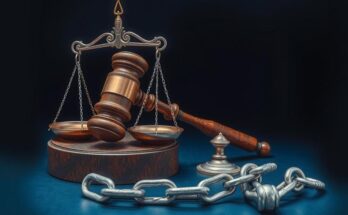Dominican Republic President Luis Abinader warned of potential ‘drastic measures’ to protect national security if the U.N.-backed anti-gang mission in Haiti fails. Despite a small contingent of international police being deployed, gang violence in Haiti remains rampant, endangering thousands and leading to a significant refugee crisis in the Dominican Republic. Abinader emphasized the mission’s importance for stabilizing Haiti and facilitating upcoming elections.
President Luis Abinader of the Dominican Republic issued a warning during his address at the United Nations General Assembly in New York, threatening to implement “drastic measures” if the ongoing United Nations-backed mission to combat gang violence in Haiti does not yield positive results. He did not specify what actions his administration might undertake to safeguard national security. The situation in Haiti is dire, with gangs controlling approximately 80% of the capital, Port-au-Prince, and increasing their influence following the assassination of President Jovenel Moïse in July 2021. This surge in violence has resulted in nearly 700,000 Haitians being displaced, with many seeking refuge in the Dominican Republic, which shares the island of Hispaniola with Haiti. President Abinader expressed gratitude towards Kenya, which is spearheading the international mission with nearly 400 police officers, supplemented by troops from Jamaica and Belize. However, the manpower provided is significantly fewer than the 2,500 officers initially pledged by various countries, prompting the U.S. government’s concerns about insufficient resources for a potential peacekeeping operation. Abinader emphasized the urgency of the mission, underscoring its importance for the establishment of free and transparent elections in Haiti, which has been without elections since 2016. With elections mandated by a transitional presidential council to occur by February 2026, he acknowledged that the necessary conditions for this have yet to materialize. He remarked, “We cannot allow the effort made to date to fail. If that were to happen, Haiti’s collapse would be imminent.” This increase in instability has had direct repercussions on the Dominican Republic, with the president noting the substantial burden placed upon his country due to the Haitian crisis. Earlier attacks by gangs on critical infrastructure have compounded the problems faced by Haiti, resulting in former Prime Minister Ariel Henry’s resignation and the establishment of a new transitional council. Abinader pointed out the Dominican Republic’s significant humanitarian engagement, revealing that last year, over 10% of medical services were provided to Haitians, with a considerable portion of foreign minors in the Dominican educational system being of Haitian descent. Despite accusations from human rights activists regarding the treatment of Haitian nationals and those of Haitian ancestry in the Dominican Republic, Abinader steadfastly defended his administration’s commitment to human rights. He concluded by highlighting improvements in domestic conditions, reporting that the country’s poverty rate has reached a historical low of 19% and that the murder rate has decreased to 10 per 100,000 inhabitants, down from 13 in the previous year. Meanwhile, Edgard Leblanc Fils, the head of Haiti’s transitional council, is scheduled to address the UN General Assembly, although no immediate comments from him or other Haitian officials were available following Abinader’s remarks.
The context of this article lies in the escalating gang violence in Haiti, which has become a pressing regional issue that poses security threats to neighboring countries, particularly the Dominican Republic. The situation has worsened since the assassination of President Jovenel Moïse in 2021, with gangs gaining control over significant portions of Haiti and severely impacting the everyday lives of its citizens. The Haitian government has struggled with instability, failing to conduct elections since 2016, which has exacerbated the humanitarian crisis. The Dominican Republic, sharing the island of Hispaniola, has been heavily involved in assisting Haiti while simultaneously responding to the spillover effects of the crisis, including an influx of displaced Haitians. The international community’s response, specifically through a U.N. mission, is critical to stabilizing the situation and enabling a return to governance in Haiti.
In conclusion, President Luis Abinader of the Dominican Republic highlighted the urgency of the U.N.-backed mission in Haiti during his address at the United Nations, promising decisive action should it fail to address the rampant gang violence that has plagued the neighboring country. His emphasis on the need for effective international support underscores the profound implications of Haiti’s instability not only for its citizens but also for the security and well-being of the Dominican populace. As the situation develops, the potential for future drastic measures by the Dominican government remains a serious consideration.
Original Source: apnews.com




